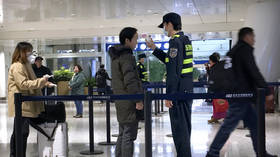Why China retaliates against Asian but not Western travel bans

Over the past few weeks, a wave of Covid-19-related alarm has seen a number of US-aligned countries imposing travel restrictions on inbound Chinese travelers. These restrictions were condemned by Beijing as being politically motivated.
The highly selective nature of the restrictions, as well as the limited scientific basis behind them, were telling evidence in support of Beijing’s anger. Some US-friendly Asian countries and regions, in particular South Korea, Japan, and Taiwan, also imposed similar bans. Thailand, which receives large numbers of Chinese tourists, did not.
In response, China announced that it was introducing tit-for-tat travel restrictions against South Korean and Japanese travelers by stopping the processing of visas for them. This was done less than a week after China opened up for quarantine-free inbound travel following three years of lockdown. Its condition for lifting these new restrictions is for the other two countries to lift theirs, which Beijing sees as discriminatory and politically motivated. Interestingly enough, at the time of writing, China has not made a similar ultimatum to the US or any Western country.
China is known to retaliate against its neighbors when they behave towards it in a way which it disapproves of, or deems threatening. Although these retaliations can also take place outside of Asia, such as when it placed a trade embargo on Lithuania over the opening of a ‘Taiwan Representative Office’, these moves tend to be more common against neighbors, as Beijing, owing to historical memory, is more sensitive to being targeted by them. It also calculates such measures to be more effective due to the closer proximity and economic interdependence of the region. After all, these countries have to live with each other, and it is much easier for one to upset the security or interests of the other.
As one such example, China placed several sanctions on South Korea when Seoul made the decision to deploy the US THAAD missile defense system, which Beijing sees as a threat to its own national security and a broader effort of US military containment. China has also used tools such as ‘tourism bans’ against the Philippines and Japan on past occasions, too. In this particular case, Beijing sees itself as being targeted by two US allies which are engaging in policies against it which it considers fundamentally unfair, and worse still, motivated by clear prejudice against China for domestic political gain.
Although deeply economically integrated, with each having China as their largest trading partner, Beijing’s bilateral relations with Seoul and Tokyo are complicated, and not just because they are aligned with the US. Rather, the issues are both nationalistic and historical. Despite cultural overlap, modern nation-state nationalism leads to South Korea and Japan perceiving themselves as culturally superior to China – which leads them to reject China’s ‘Sinocentric’ view of the world with itself as the historical ‘Middle Kingdom’. Neither country wishes to be dominated by China politically, which is a key reason why the presence of the US finds continuing legitimacy in both countries.
While Japan’s hostility to China has always been obvious, the rise of China as a major power in recent years has produced a strange cultural and political backlash in Korea that sees the conflation of Korean national culture and traditions with those of China as offensive. This has produced a high level of hostility, unprecedented in recent years. While South Korea, owing to economic and strategic reasons, is careful not to overtly confront China in its foreign policy, this negative sentiment is becoming difficult to contain.
This is what ultimately led to South Korea’s Covid-19 travel restrictions, combined with the fact that South Korea takes the disease more seriously than the West. Beijing, however, perceives both Seoul’s and Tokyo’s decisions as attempts to humiliate and degrade it. As a result, China has chosen to retaliate against them both. While China’s closure for three years means nobody has been visiting anyway, close integration means that the number of businesspeople who go from country to country, as well as scholars and other exchanges, is high. This means that, due to geography, the move is petty, but has consequences. Ultimately from China’s perspective, there is something exceptionally egregious about neighbors repeating the stunts of the West against it. Coming from fellow Asians, this is a far more sensitive and politically offensive matter.
The statements, views and opinions expressed in this column are solely those of the author and do not necessarily represent those of RT.













